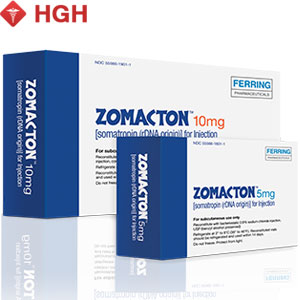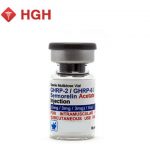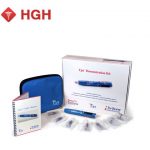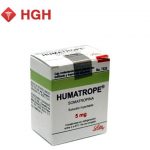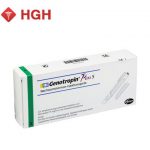GENOTROPIN

Growth failure or deficiency is explained by the lack of a simple yet incredible component of everybody's organism – human growth hormone (HGH). Without it our bodies cannot function anywhere near full potential.
Genotropin is an injectable solution that mimics the exact makeup of the human growth hormone. It stimulates adequate metabolism of carbohydrates, proteins, and lipids, as well as retention of phosphorus and potassium, bone health, and muscle development and endurance. Genotropin is known to improve energy and vitality, stimulate memory functions and emotional well-being.
Genotropin
Genotropin is mainly Somatropin, a popypeptide hormone of RDNA origin. It has the same 191 amino acid sequence as the human growth hormone. Many people aren’t aware of the significance of this hormone. HGH is produced by the pituitary gland in children and adults, males and females alike. It stimulates growth and generation of cells. No child can grow into adult size without this master growth hormone. It is because of HGH that muscles develop, fat and carbohydrates are metabolized, and bones grow strong.
Usage of Genotropin
The medicine is sold as an injection pen made simple for use. The solution is administered through subcutaneous injection underneath the skin. It consists of 5 mg Somatropin along with glycine, disodium phosphate anhydrous, m-cresol, sodium dihydrogen phosphate, mannitol, and water. It may also be distributed as a powder in which case it needs to be dissolved and then injected.
After use functions of HGH are revived, most importantly the metabolism of carbohydrates, proteins, and lipids. A normal body composition is achieved with skeletal muscle growth, bone mineral intake and metabolism of fats. The latter is the favorite of most Genotropin users. Fat mobilization is how the body makes energy. When Genotropin stimulates this function, physical and psychological symptoms bring livelihood back to patients of growth failure or deficiency.
Children with growth failure that is offset from an inadequate secretion of the growth hormone can benefit from Genotropin as well as adults with GHD. However, precautions, contraindications and dosages vary from each individual to the next. This is why we strongly stress against foregoing a medical professional and purchasing Genotropin without a prescription. Not only is this illegal, it is extremely dangerous. To ensure all precautions are met, some blood work has to be done along with analysis of medical history and current condition.
Administration of Genotropin
For adults with GHD, a starting dose can be as little as .2 mgs per day and can be increased gradually. For children, dosages of genotropin can range from .15 to .5 mg per kg every week. Dosages should be followed strictly to avoid overdosage.
Indications and contraindications of Genotropin
Growth disturbance can be identified by testing secretion levels of the human growth hormone by the pituitary gland. Two different tests must confirm GHD. Even if you had been diagnosed and/or treated as a child, you must be retested and confirmed to have GHD. Below is a list of those not recommended to take Genotropin:
- Patients who have undergone open heart surgery, abdominal surgery, acute respiratory failure
- Children with Prader-Willi syndrome who are obese or have respiratory impairment; they must also be monitored for sleep apnea
- Patients with an acute critical illness
- Children with closed epiphyses
- Anyone with an allergy to somatropin or other ingredients of Genotropin
- Boys with Prader-Willi syndrome with upper airway obstruction
- Those with active proliferative or severe non-proliferative diabetic retinopathy
- Anyone with an active malignancy; anyone with a preexisting tumor must be monitored closely
For a complete list of contraindications of Genotropin, consult with a doctor who specializes in hormones.
Dosage Precautions of Genotropin
The treatment cycle and dosage should be personalized to every patient. It is never a good idea to inject more than the specified dosage or more often than indicated. Your doctor will inform you of the necessary precautions you must take before taking on medical Genotropin treatment.
Genotropin comes in the form of a self-injection device the size of a pen. The injection site on the body should be rotated. On average, a children’s dose of Genotropin is .025-.05 mg per every kg of weight every day. Usual adult doses range from 0.2 to 2 milligrams. Only a certified physician or doctor can prescribe Genotropin. Treatment of children with growth failure should be monitored by a physician. In instances when the medicine fails to increase growth rate, different causes of growth failure should be tested for. Such include advanced bone age, antibodies to recombinant human GH (rhGH), undernutrition, and hypothyroidism. Nutrition is also a very important factor of increasing growth hormone function. Special diet can aid in the process.
You should update your physician along the way of treatment so should any complications occur, you could spot them immediately and reverse them. It is most important to watch for possible side effects. An allergic reaction to one or more of the ingredients in Genotropin can be identified with hives, rash, or swelling. Blood sugar levels may temporary increase but will normalize after treatment.
